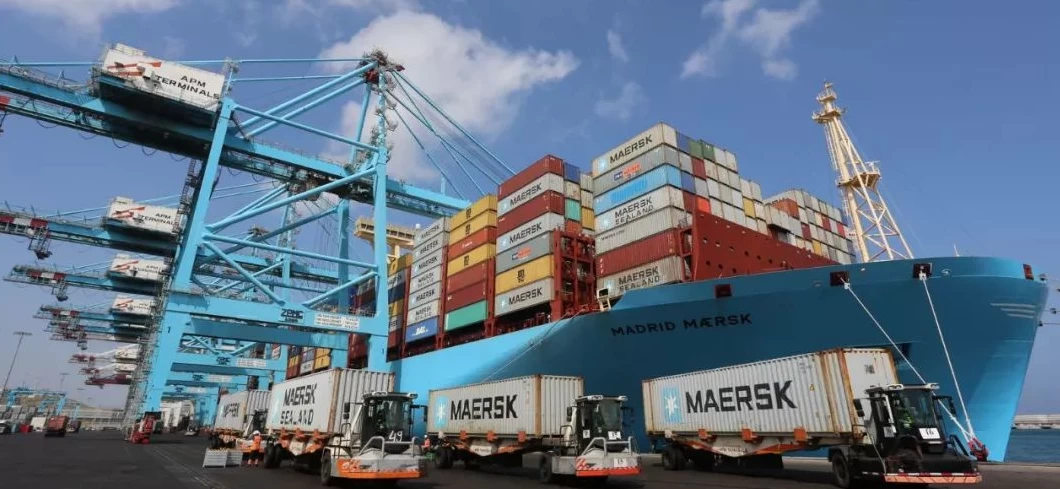APM Terminals Barcelona, the Maersk-owned port and terminal operator, has announced the delivery of 17 Konecranes NSC 644 EHY hybrid straddle carriers.
According to APM Terminals, these models use 32.5% less fuel than today’s most modern cranes and will reduce the terminal’s annual CO2 emissions by 50 tonnes.
Julián Fernández, General Manager of APM Terminals Spanish Gateways, underlined the importance of this €21.4 million investment, saying, “This is the beginning of our path towards the electrification of our equipment, in line with our ambition to reduce emissions by 70% by 2030 and by 2040 Global goal of net zero emissions”
In the realm of sustainable shipping practices, Maersk stands out as a beacon of environmental responsibility. Their unwavering dedication to achieving net-zero emissions by 2040 sets a high standard for the entire international shipping company sector. Embracing the significance of sustainability, Maersk has strategically integrated hybrid carriers into their operations, showcasing a forward-looking approach to reducing carbon footprints.
 Maersk's Sustainability Commitment
Maersk's Sustainability CommitmentIn pursuit of environmental excellence, Maersk has set ambitious objectives to align with the company's sustainability vision. By targeting net-zero emissions by 2040, Maersk demonstrates a steadfast commitment to reducing its carbon footprint significantly. The intermediate goals established for 2030 serve as crucial milestones in this journey towards sustainable practices.
Striving for net-zero emissions by 2040 underscores Maersk's dedication to environmental stewardship.
The intermediate targets set for 2030 highlight the company's proactive approach to achieving long-term sustainability goals.
As an industry leader, Maersk sets a precedent for other international shipping companies to prioritize sustainability.
Through strategic collaborations and alliances, Maersk fosters a collective effort within the sector to drive sustainable practices forward.
Hybrid straddle carriers represent a groundbreaking advancement in sustainable shipping technology. These carriers seamlessly integrate electric power with traditional fuel sources, optimizing operational efficiency while minimizing environmental impact. By harnessing the power of hybrid technology, companies like Maersk can significantly reduce their carbon footprint and lead the industry towards a greener future.
The introduction of carbon-neutral methanol vessels marks a pivotal moment in the maritime industry's transition to eco-friendly practices. These vessels utilize innovative propulsion systems that rely on renewable energy sources, ensuring minimal greenhouse gas emissions during operations. Maersk's investment in such cutting-edge technology underscores its unwavering commitment to sustainable shipping solutions.
The implementation of hybrid carriers translates into notable fuel efficiency gains for companies like Maersk. By leveraging a combination of electric power and conventional fuels, these carriers optimize energy usage, resulting in reduced overall fuel consumption. This heightened fuel efficiency not only lowers operational costs but also contributes to mitigating the environmental impact associated with traditional shipping practices.
One of the most significant advantages of hybrid carriers is their substantial contribution to CO2 emissions reduction. Through the adoption of advanced technologies and sustainable fuel alternatives, such as carbon-neutral methanol, Maersk can achieve remarkable reductions in greenhouse gas emissions. This proactive approach aligns with Maersk's overarching goal of achieving net-zero emissions by 2040, solidifying its position as an industry trailblazer in environmental sustainability initiatives.
To ensure continued progress towards sustainable shipping practices, Maersk recognizes the importance of scaling up its operations effectively. By expanding its fleet with more hybrid carriers, Maersk can amplify its environmental impact while meeting the rising demands of the international shipping company sector. This strategic move not only enhances operational efficiency but also reinforces Maersk's position as a frontrunner in eco-conscious maritime solutions.
Expanding the fleet with additional hybrid carriers presents a significant opportunity for Maersk to bolster its sustainability initiatives. By increasing the number of vessels equipped with advanced environmental technologies, Maersk can elevate its capacity to transport goods globally while minimizing carbon emissions. This proactive approach aligns with Maersk's overarching goal of achieving net-zero emissions by 2040, setting a new standard for environmentally responsible shipping practices.
In parallel with fleet expansion, infrastructure development plays a pivotal role in enhancing Maersk's operational capabilities. Investing in sustainable infrastructure, such as renewable energy-powered ports and efficient logistics hubs, enables Maersk to streamline its supply chain operations while reducing overall environmental impact. By modernizing key facilities and optimizing logistical processes, Maersk paves the way for a more sustainable future in the shipping industry.
Despite the promising outlook for sustainable shipping, Maersk faces certain challenges that could impede progress towards net-zero emissions. Addressing these obstacles is crucial to ensuring the successful implementation of eco-friendly practices within the maritime sector.
Navigating technological limitations poses a significant hurdle for Maersk in advancing its sustainability agenda. Developing cutting-edge solutions that integrate seamlessly with existing infrastructure requires substantial research and innovation investments. Overcoming these technological barriers demands close collaboration with industry partners and stakeholders to drive forward-thinking advancements in sustainable shipping technology.
Navigating complex regulatory frameworks presents another obstacle for Maersk on its path to achieving net-zero emissions. Adhering to stringent environmental regulations while maintaining operational efficiency requires careful planning and strategic compliance measures. By actively engaging with regulatory bodies and advocating for progressive policies, Maersk can navigate regulatory hurdles effectively and lead by example in sustainable business practices.
Summarize Maersk's proactive approach towards sustainability goals and technological advancements in hybrid carriers.
Assess the practicality of achieving net-zero emissions by 2040 through innovative strategies and collaborations.
Reflect on the transformative impact of sustainable shipping practices on the industry's future trajectory.